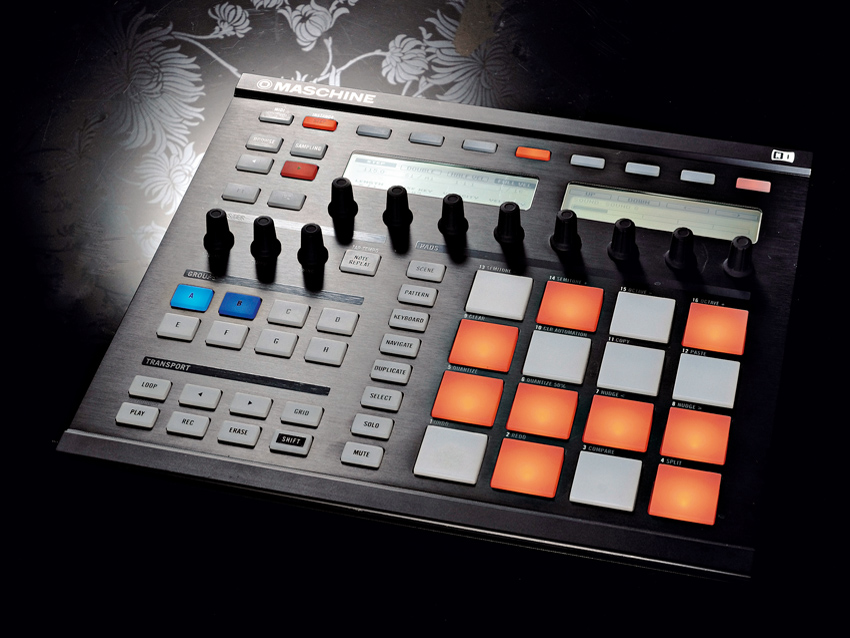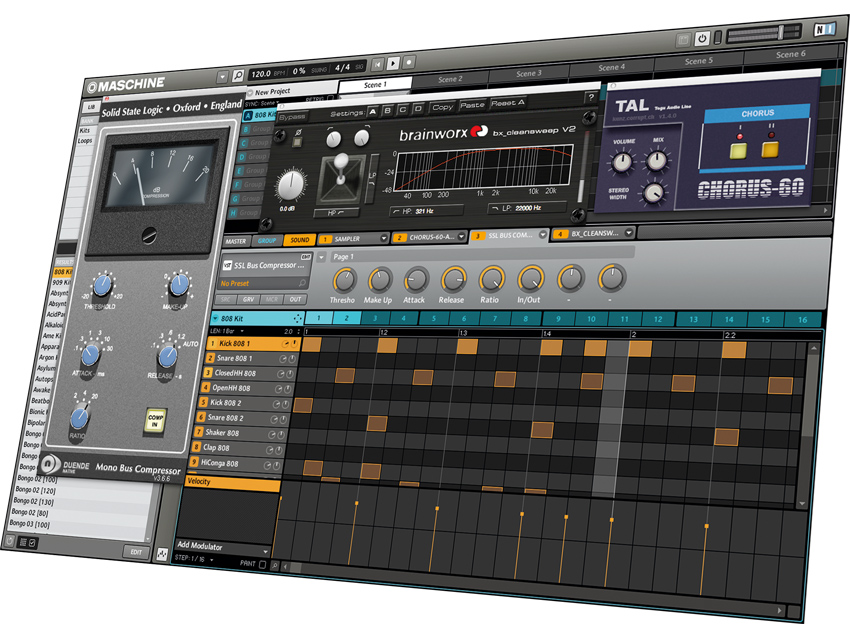MusicRadar Verdict
There's no doubt about it, Maschine rules the roost. The only question is: what's next?
Pros
- +
VST/AU support. Drag-and-drop from Finder and Explorer. Swing per sound.
Cons
- -
Very little.
MusicRadar's got your back

NI Maschine 1.6

NI Maschine 1.6
When it first landed, we loved Maschine for its fantastic library, intuitive hardware and software interfacing and revolutionary workflow. But it did leave us aching for more features to ice the cake.
Many of these followed in the form of 1.1 and 1.5 - features like instant rendering of audio and vintage sampler emulations. 1.6 sees arguably the most important update to date - plug-in support.
"A feature that stands out is Pad Link, which lets you trigger multiple samples from a single 'master' pad."
Plug-in baby
The addition of plug-in support first created a stir online when the public beta was released for download back in January.
A justified stir it was too - Maschine's standalone mode suddenly became a fully-equipped sequencer in its own right, with the capabilities to trigger and resample external MIDI instruments, play internal ones, build beats and riffs using its library and sample external audio using its inputs, not to mention use VST and AU effects to treat and process your creations.
But with the dedicated hardware remaining the same since launch day and the software seeing such fundamental modifications, how are these changes implemented and has the workflow we know and love been warped and mangled beyond recognition to shoehorn these new features in?
Simply put: not at all. NI has done an excellent job of bolting on what is essentially a landmark addition to the Maschine's mantra without rendering the hardware irrelevant through too many new mouse control options.
Tab-tastic
When you open 1.6 you're greeted with new Module tabs - four in total. Each Module can host samples, effects, plug-ins - whatever you want that particular sound to contain.
Want all the hottest music and gear news, reviews, deals, features and more, direct to your inbox? Sign up here.
Press Shift and Browse and you'll see a new Type in the form of 'Plugin'. On the right screen, all your active plug-ins can be scrolled through using the same knobs you browsed samples and effects with in previous versions.
Once you've loaded a plug-in, it's playable from both the pad and from any connected MIDI keyboards. The nifty thing is that the GUI window doesn't pop up when you select it.
Instead, parameters are mapped across the eight macro knobs on the hardware, with pages allowing you to scroll through all the available control options. Though some of the parameter names can be a tad cryptic, it's a quick and easy way to get hands-on without having to look at the screen.
Of course you can open the GUI if you so desire by clicking the Edit button or pressing the button above the first Module.
If you don't fancy scrolling through pages of parameters you can wipe every mapping, enter Learn mode and by clicking on any knobs or faders on the interface, it'll map that control to the macro.
One thing we would have liked to see is plug-in preset control via the hardware unit itself. At the moment, this is only possible via mouse control, though there are some custom workarounds on the Maschine forum via the Controller Editor software.
New addition
There are of course other additions to version 1.6 such as swing per sound, the ability to drag-and-drop samples from Finder and Explorer and a bunch of other workflow enhancements that all work as expected.
One that stands out is Pad Link that makes it possible to trigger multiple samples from a single 'master' pad. Great for layered kicks and claps, which can be triggered from a single note, internally or externally.
So what of Maschine's future? Surely a new hardware controller is on the way - it's hard to imagine cramming any more into the existing one without negatively affecting the workflow.
And what would the new hardware contain? We know NI has the capabilities to build interfaces into controllers - Guitar Rig and Kontrol S4 for example - so will Maschine 2 offer a physical audio I/O?
Sample audition via the hardware and time-stretching are two much-called-for features but whatever the future holds, NI has been listening to its userbase since day one and it's led to this: one of the most exciting music products on the market.
Future Music is the number one magazine for today's producers. Packed with technique and technology we'll help you make great new music. All-access artist interviews, in-depth gear reviews, essential production tutorials and much more. Every marvellous monthly edition features reliable reviews of the latest and greatest hardware and software technology and techniques, unparalleled advice, in-depth interviews, sensational free samples and so much more to improve the experience and outcome of your music-making.
